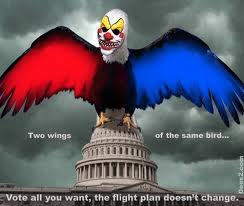 |
| Dees Illustration |
J.G. Vibes
Activist Post
What is a false dichotomy? It is a situation where there seems to be a narrow field of two options to choose from, when there is actually a larger set of possibilities beyond those guidelines. In other words, you are asked to choose between black and white, leaving you to think that the only colors in existence are black, white and maybe gray, when in reality there is a whole palette of different shades and tints that were left completely out of the discussion.
The statement, “If you’re not with us, then your against us” is a classic false dichotomy, because it presents two options — both of which amount to violence — while completely neglecting the option of remaining neutral. Likewise, the traditional two-party political system in the West is a striking example of the false dichotomy. The Democrats and Republicans may have some small insignificant differences that play on people’s emotions, but when it comes to all the important things that effect everyday life for average people there is a “bipartisan consensus” to protect Anglo-American business interests, regardless of public opinion. This bipartisan alliance against the average citizens results in a one-party system that gives the illusion of being a two-party system. This leaves no choice for the majority of the country who just want to live honest lives without being subject to the policies that either of those two parties are seeking to enact.
After watching identical policies transpire under Bush and Obama, most Americans have come to understand that both parties are one and the same.
 |
| Ad |
However, there are many deeper false dichotomies in our civilization which can also hinder our ability to see the big picture.
The most pervasive example would be that of big business and government; Wall Street and Washington.
It’s no secret that big business works so closely with the government that they are arguably the same entity; this fact is highlighted by the revolving door that exists between these two different factions of the state. Most people who find themselves in high-level political positions were once CEO’s of fortune 100 companies, and those who aren’t will likely become a well-connected lobbyist upon leaving office.
Dick Cheney, vice president and top executive at Halliburton, or Goldman Sachs CEO turned treasury secretary, Henry Paulson, would be among the most obvious examples of this revolving door. Both of the crooks in question undoubtedly used their position to influence events in such a way that would greatly benefit their respective businesses — this is commonplace in Washington. It is even more typical for those involved in business to develop quiet and cooperative relationships with people who already have political power, which allows them to direct national policy from behind the scenes by simply befriending or bribing decision makers.
The relationships between the world’s most powerful people are blurred in the public, but behind the scenes many of them work very closely together, went to the same colleges, go to the same social clubs, attend the same meetings, and send their children to the same schools. What this tells us is that beyond political parties and campaign rhetoric there are many connections and relationships which are rarely discussed in the public.
Taking this a step further, the government has been able to develop a forced monopoly on education, while big business has been able to develop an equally damaging monopoly over the media. Since big business and government both represent different arms of the same ruling class we can say that together through their control of various social institutions, such as the media and education system, they are able to direct public opinion away from their crimes and establish a nationalistic folklore in the public consciousness which is favorable to them and their worldview. Washington and Wall Street is on the same team, working toward the same goals, and in many cases are represented by the very same people.
On paper it may seem like these two interests would be at odds, because it is technically the government’s job to regulate industry. Unfortunately, this is where things start to get dangerous, because the big corporations that are committing fraud and really need to be put in check are the ones that remain above the law and always seem to get off the hook. Sometimes they even get bonuses in the form of tax funded bailouts!
 Meanwhile, the small business owners and entrepreneurs find it harder and harder stay open because they don’t have a direct line to Washington, or the extra income to spend on lobbyists. There is nothing that Fortune 100 companies love more than to see more taxation and regulation. They have the ability to pull political favors to get subsidies, tax breaks and other special treatment, all the while knowing that the measures they just avoided will make their competition that much weaker. The legal measures that are initially enacted to punish the ruling class are ultimately used in their favor because they have total control of the political and legislative systems.
Meanwhile, the small business owners and entrepreneurs find it harder and harder stay open because they don’t have a direct line to Washington, or the extra income to spend on lobbyists. There is nothing that Fortune 100 companies love more than to see more taxation and regulation. They have the ability to pull political favors to get subsidies, tax breaks and other special treatment, all the while knowing that the measures they just avoided will make their competition that much weaker. The legal measures that are initially enacted to punish the ruling class are ultimately used in their favor because they have total control of the political and legislative systems.
A politician will rarely do something that will have a negative impact on his business ventures, or those of his colleagues. In fact, one could argue that politics itself, and the very institution of government, has been specifically designed as a means by which the ruling class can coercively maintain their corporate monopolies and legitimize their many social aggressions. Expecting the government to watch over big business is along the same lines as expecting Fox News to do a hit piece on Rupert Murdoch — it’s just not going to happen.
Experience has shown us that we can’t trust the government to honestly investigate organizations that they themselves are closely tied to, and quite often profiting from. To prevent this kind of corruption we must first identify the elephant in the room: Washington and Wall Street are simply two different headquarters, which serve separate functions for the same ruling class.
J.G Vibes is an activist and artist who has been studying occult history, theology and government for most of his life. In 2007 he began hosting electronic dance music events and establishing Good Vibes Promotions as a respected name in the counter culture. It wasn’t until 2008 that he began to fuse his philosophic ideas with his events, this was around the same time that he began writing and putting together the plan for his book Alchemy of the Modern Renaissance. Since then he has established a record label and a website that hosts a wide variety of activist information that is frequently updated. www.goodvibespromo.com (facebook page updated more frequently).
linkwithin_text=’Related Articles:’


Be the first to comment on "Government and Big Business: The False Dichotomy"